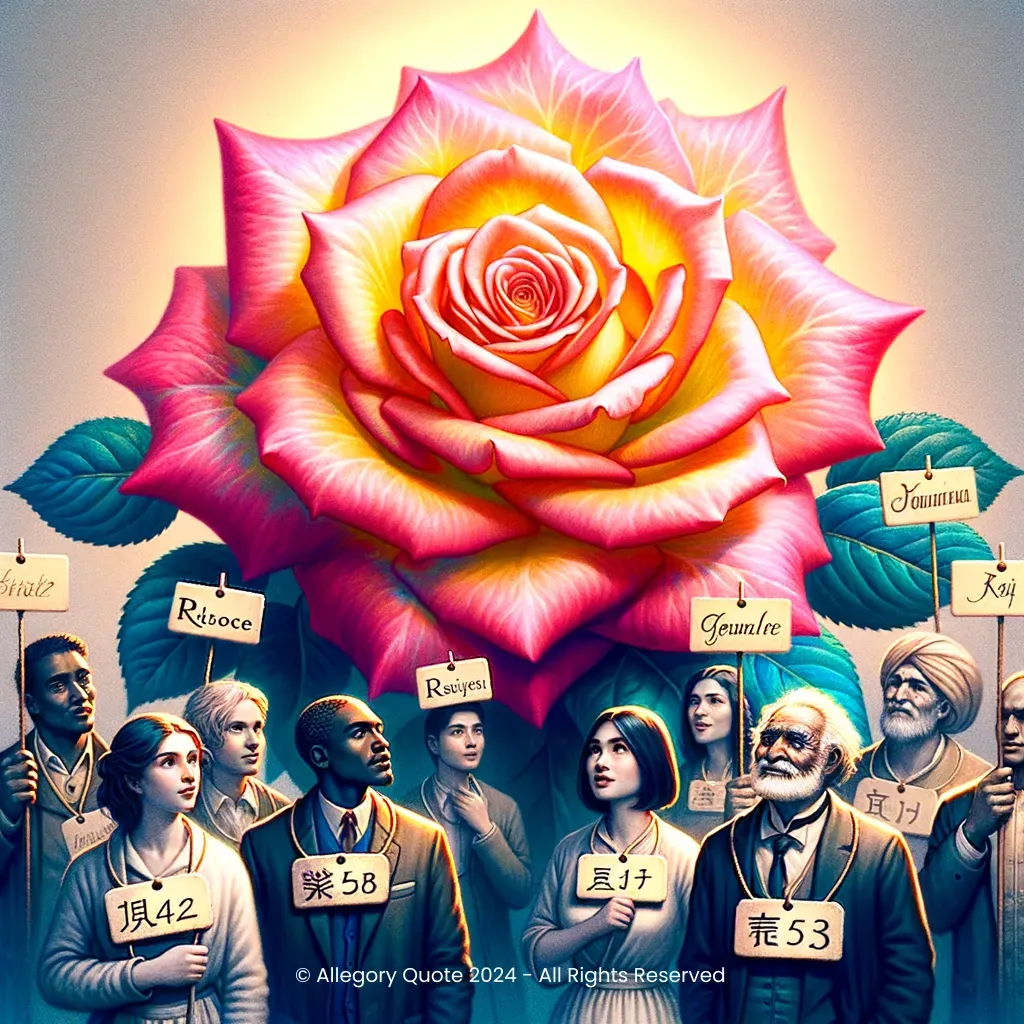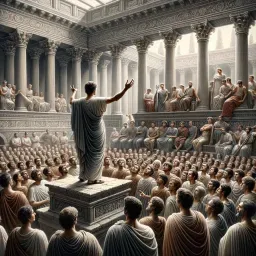”What's in a name? That which we call a
rose by any other name would smell as sweet“

0
0
0
0
- Meaning
- This phrase suggests that the names and labels we attach to things do not affect their inherent qualities. In the play, Juliet muses that Romeo's name, which ties him to the rival Montague family, doesn't change who he is as a person. The "rose" metaphorically represents Romeo, implying that his worth and identity are independent of his family name. This extends to a broader philosophical idea that the essence of a thing is not altered by what it is called.
- Allegory
- The image elements—a beautiful rose and the diverse crowd—portray the core idea that what something is called does not change its inherent value. The blooming rose represents the consistent essence of an object or person, while the name tags indicate the superficial labels that people might assign. The diverse group of onlookers shows that understanding and appreciation transcend names, reflecting universal human experiences and values.
- Applicability
- In our daily lives, this phrase encourages us to look beyond superficial labels, prejudices, and stereotypes. Whether it's in relationships, at work, or even when judging ourselves, understanding that a name or title doesn't define essence can lead to a more open-minded, accepting, and profound understanding of people and things around us.
- Impact
- This phrase has had a significant cultural impact, becoming a cornerstone of discussions related to identity, labels, and the essential nature of things. It is often cited in literature, education, and pop culture to illustrate the idea that the intrinsic qualities of something are not altered by what it is called. Its enduring presence in discussions about human nature, names, and identity underscores its universal and timeless appeal.
- Historical Context
- The historical context of this phrase dates back to the late 16th century when Shakespeare wrote "Romeo and Juliet," around 1595-1596. During this period, family names and social status were imbued with significant meanings and could affect people's lives profoundly. The Montagues and Capulets in the play represent two feuding aristocratic families, reflecting the period's intense family loyalty and the social consequences of name and lineage.
- Criticisms
- While the phrase is celebrated for its poetic insight, some critics argue that it oversimplifies the complexities of identity and the social power of names. Names and labels can carry weight and meaning that influence perception and behavior, which Juliet's assertion overlooks. Additionally, in certain contexts, names can carry cultural, historical, or personal significance that affects how individuals and groups are treated.
- Variations
- While the phrase is widely recognized in its original English form, it has been interpreted similarly in other cultures, often reflecting a universal understanding that identity and value are more profound than labels. For instance, in Spanish, the expression "Así se llame como se llame, sigue siendo lo que es" carries a similar sentiment.
-

The golden age is before us, not behind us.
-

If music be the food of love, play on.
-

All that glisters is not gold.
-

There is nothing either good or bad but thinking makes it so.
-

Parting is such sweet sorrow.
-

A horse! a horse! my kingdom for a horse!
-

The lady doth protest too much, methinks.
-

What is past is prologue.
-

This above all: to thine own self be true.
-

All the world's a stage, and all the men and women merely players.
-

Friends, Romans, countrymen, lend me your ears.
-

If to do were as easy as to know what were good to do, chapels had been churches, and poor men's cottages princes' palaces.
No Comments